Sharp fall in tourism hits Beijing
Updated: 2014-01-13 00:14
By Zheng Xin (China Daily)
|
||||||||
Weak economy, a strong yuan, as well as smog given as reasons
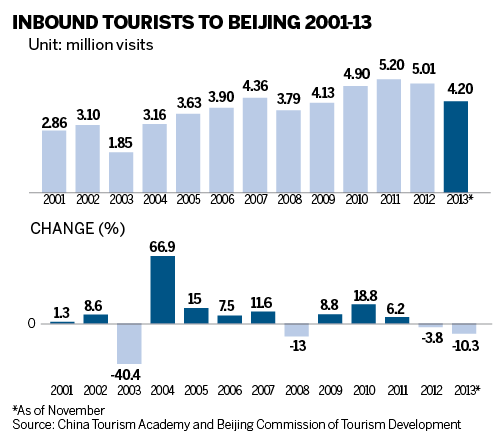
Beijing witnessed an unexpected sharp drop in inbound tourism in 2013, as tourism officials looked for ways to reverse the trend.
From January to November, the city recorded 4.2 million visitors, down 10.3 percent year-on-year, the Beijing Tourism Development Commission reported.
The commission blamed the weak global economy and a strong yuan, as well as the city's ongoing pollution problems.
The effect of a 72-hour visa waiver for transit passengers also failed to meet expectations, industry insiders said.
Based on research showing that most people passing through Beijing Capital International Airport would take advantage of the waiver, Wang Yue, deputy director of the authority, said earlier that the policy was expected to attract 20,000 visitors in the first year.
However, the Beijing General Station of Exit and Entry Frontier Inspection said the number was just 14,000.
Beijing is not the only city experiencing a decline.
Statistics from the China National Tourism Administration show inbound tourism reached 118.2 million visits from January to November, a 2.47 percent year-on-year decrease.
China's inbound tourism market has been stagnant in recent years, as tourists to the nation, many of whom are from Japan, South Korea, Russia and the United States, were shunted to other Asian destinations, including Thailand, Indonesia and Malaysia.
These strong competitors have experienced fast growth in recent years, said Dai Bin, director of the China Tourism Academy.
"Compared with countries such as those in Southeast Asia, which have invested heavily in inbound tourism development, China hasn't taken inbound tourism as seriously," said Yang Jinsong, a professor of international tourism at the China Tourism Academy.
"The tropical island of Hainan used to receive many tourists from Russia," he said, "but many of them have started to go to places such as Thailand instead."
Compared with other destinations, he said, Beijing is a "struggling startup" when it comes to the tourism business.
One important step that experts say needs to be taken is to make the market more attractive to Chinese travel agencies.
Yang Xiufang, head of international cooperation for China Swan International Tours, said few Beijing agencies have started to offer two- or three-day packages for passengers who take advantage of the visa waiver because they see little opportunity for profit.
"Most companies are focused on outbound tourism, as more Chinese are traveling abroad due to the strong yuan," he said.
The city also lacks appeal due to its ongoing battle with pollution, said another industry insider who did not want to be identified.
"Considering the market (for transit passengers) is unscheduled and small, most agencies would rather invest in domestic and outbound tourism, which is relatively easy money," he said.
A common response among experts was the call for better cooperation between travel agencies, airlines and the Beijing airport to attract tourists.
In August, Lu Yong, then director of the Beijing Tourism Development Commission, said his authority would work to build an alliance between Beijing Capital International Airport and Air China to deliver ticket discounts.
However, industry insiders say this has failed to materialize. So too has a much-talked-about plan for a pilot duty-free shopping haven near Yabao Road, a retail hub for many foreign traders, a year after it was proposed.
Jiang Yiyi, director of the China Tourism Academy's International Tourism Development Institute, said cheaper airfares are key to attracting more transit passengers.
"Many transit tours are attractive because visitors can explore two destinations at once," he said. "With the global economy the way it is, the Chinese government should be doing more with airports and airlines to come up with discounts."
Bosses at the Beijing Capital International Airport say they are looking into offering cut-price deals at hotels and shopping areas, as well as for traditional Chinese massage or tea-tasting sessions in terminals for transit passengers who take up the visa waiver.
Professor Yang at the China Tourism Academy said attracting visitors requires a long-term national plan, which includes improving the country's image and investment in inbound tourism resources.
"Many tour packages are outdated. Traditional tourism resources have already lost their appeal among today's travelers," he said.

 Cristiano Ronaldo wins FIFA best player award
Cristiano Ronaldo wins FIFA best player award
 Xuelong carries on mission after breaking from floes
Xuelong carries on mission after breaking from floes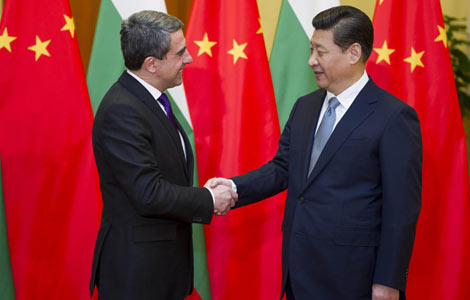
 Beijing and Sofia vow new initiatives
Beijing and Sofia vow new initiatives
 71st Golden Globe Awards
71st Golden Globe Awards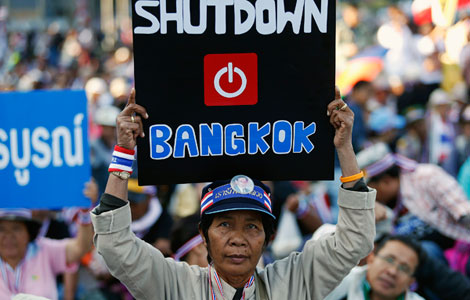
 Bangkok unrest hurts major projects and tourism industry
Bangkok unrest hurts major projects and tourism industry
 No pant for cold subway ride
No pant for cold subway ride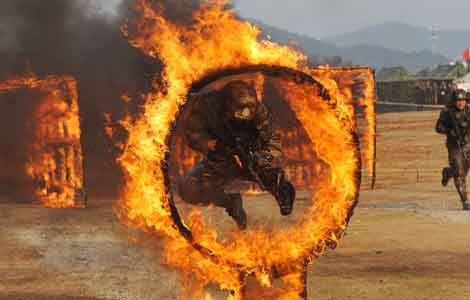
 Tough army training turns boys into men
Tough army training turns boys into men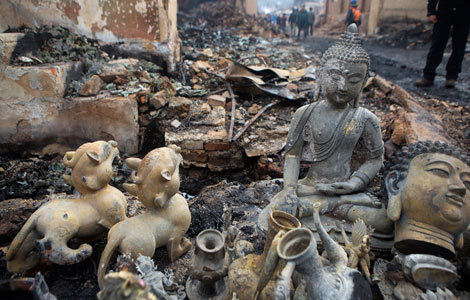
 Blaze prompts concern for ancient buildings
Blaze prompts concern for ancient buildings
Most Viewed
Editor's Picks

|

|

|
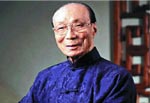
|

|

|
Today's Top News
Jackson's family bid for new trial denied
Newspapers must change or die
Abe’s brother to explain shrine visit to US
Protests cannot end Thai deadlock: observers
Mercy killing still a hot button issue
China builds army 'with peace in mind'
UN plea made on war victims
Li: China's tech innovation a priority
US Weekly

|

|






